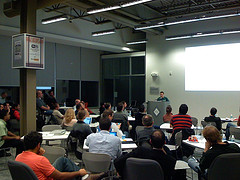You can’t deny it: Facebook Applications have been a hot topic from the day the Facebook API was announced 5 months ago. Early success stories spread quickly, and the app-installation-fever that most users went through was overwhelming. Invitations to install this app and that one, we all had flooded inboxes.
Here in Toronto, FaceBookCamp 1 and FacebookCamp 2 were wild successes with over 300 people in attendance at each. There are no surprises when Facebook takes over any conversation, and certainly not one about startups. StartupWeekend here in Toronto is now Facebook Weekend.
I am a fan of Facebook, and have written my own predictions on how successful they will be.
So, should you consider building your startup as a facebook app. Or is that, should you consider building a facebook app as a startup?
I think there are a few fundamental problems with trying to do so, and I will try to explore those here. As a disclaimer: I have not tried to start a business on Facebook, I have just been an observer. I am also aware that there are some facebook apps which are doing quite well, and time will tell if they truly manage to cash-out.
You cannot build a business on someone else’s platform when they don’t see you as a partner.
This is the single biggest obstacle. Facebook does not see application developers as partners in any way. In fact, they forbid you from calling yourself a partner.
The implications of this might not seem so bad up front. You are still getting access to a great API, lots of community-based support and most of all, you have access to Facebook’s 40-50 million users.
The reality is more harsh however. You are putting yourself at the mercy of an organization that is growing at a phenomenal rate, you do not know what sort of value they prescribe to your, or any other, application and there are no guarantees about how long the platform will be as accessible as it is today.
To make money, you need to have your own customers.
To make real money, you need to have customers, even just users will do, but you have to have something.
When you are building your business on Facebook, you won’t get either one. You get visits. Brief interactions with someone else’s users, and you have no control.
Being able to move people from being visitors in to being customers is critical to building any sort of sustainable business. In order to generate any sort of sustained revenue, you need to be able to deliver ongoing value to your customer, so they can continue to either pay you, or click on your ads.
If they don’t innovate, you die.
You may or may not remember Compuserve, BBSs, AOL, and countless other internet beomouths. In their day, they were all the big thing, the had tens of millions of customers, doing billion dollar deals and they were bringing new customers in faster than you or I could count.
The one common theme between all their stories? They have all gone away slowly and painfully.
You may be able to build the most popular Facebook application there is, and you may be able to generate some cash through advertising or sponsorships, but one thing you won’t be able to do, when the time comes, is take your customers with you.
When Facebook’s day does come, and it will come at some point, it will be your last day too. You won’t have a hope in hell in getting contact information or any other sort of data about your customers, because they were never your customers in the first place.
This road has been travelled before.
Your business is their feature
The name Facebook Applications is misleading. You are building Facebook Features. Slideshows, Maps, Sticky Notes, all of it, they are all features.
I don’t have to tell you that a feature is not a business, because you already know that. Don’t you?
You have two options: Change or Die
You are building your, *ahem* business *ahem* under the Facebook Terms of Service. While they may be relaxed and manageable now, Facebook can change them at any time.
When that happens, you will have two options. You can do what they say and change your application, possibly removing things like advertisements, or you can go away and die. (And no, you can’t take your users with you).
Treat your own customers well, and they reward you. Treat someone else’s customer well, and they are rewarded
We have already established that you don’t have your own customers or users when building a Facebook Application. The kicker here is that you now have no incentive to enhance your ‘application’. The better job that you do, the more Facebook will benefit.
You may being saying “aha, that means what you said above is invalid”. Well, almost. You see, at some point you begin to provide a diminishing return to Facebook. Their users are spending too much time in your application. At this point, Facebook has more to gain by making sure that you are no longer the flavor of the month, and they gain by having their customers go to other applications. The more people move around in Facebook, the more they benefit.
Use Facebook as a conduit to your real business
Facebook has almost 50 million users. You can’t argue with those sorts of numbers. This level of access to so many entrenched users is unusual.
The opportunity is for you to extract a feature from your real business, and provide that feature as a Facebook Application. You can then try to link users through to your real website. If you are building something worthwhile, they will come there with you and you can focus on turning them in to real customers.
The fact is, as a startup you should be focused on building something that is useful on its own. You need to create value that people are willing to pay you for, either with their attention or their own money. Until you can do that, you do not have a sustainable business. You have an experiment, a feature, an idea.


 Simon’s question when he got up was: “should this stay as a hobby, or should I start taking it seriously”. My advice is: focus on the product, keep iterating it in your own community, and put it in a couple of others. Once you get it right, start spreading it out and then quit your day job when you can afford to, but no sooner.
Simon’s question when he got up was: “should this stay as a hobby, or should I start taking it seriously”. My advice is: focus on the product, keep iterating it in your own community, and put it in a couple of others. Once you get it right, start spreading it out and then quit your day job when you can afford to, but no sooner.